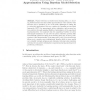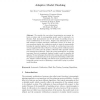286 search results - page 33 / 58 » Using inaccurate models in reinforcement learning |
ICCBR
2001
Springer
14 years 5 days ago
2001
Springer
It is useful for an intelligent software agent to be able to adapt to new demands from an environment. Such adaptation can be viewed as a redesign problem; an agent has some origin...
TSP
2011
13 years 2 months ago
2011
—Radar high-resolution range profiles (HRRPs) are typical high-dimensional, non-Gaussian and interdimension dependently distributed data, the statistical modelling of which is a...
AI
2006
Springer
13 years 11 months ago
2006
Springer
Real world multiagent coordination problems are important issues for reinforcement learning techniques. In general, these problems are partially observable and this characteristic ...
PKDD
2009
Springer
14 years 2 months ago
2009
Springer
Abstract. Feature selection in reinforcement learning (RL), i.e. choosing basis functions such that useful approximations of the unkown value function can be obtained, is one of th...
IGPL
2006
13 years 7 months ago
2006
Abstract. We consider the case where inconsistencies are present between a system and its corresponding model, used for automatic verification. Such inconsistencies can be the resu...


